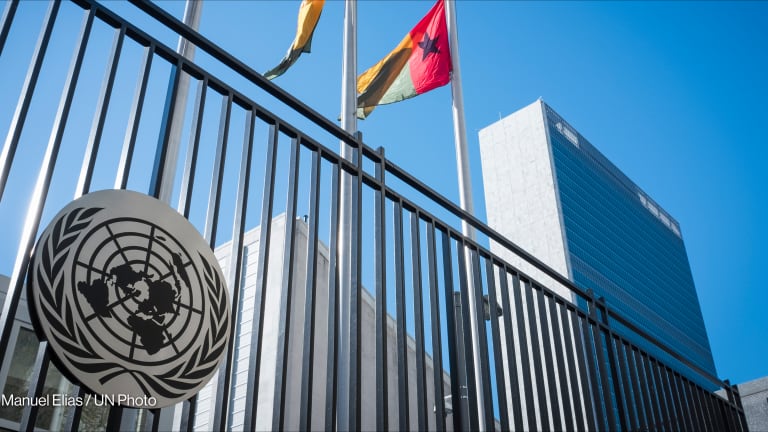
Global development’s center of gravity shifted to New York City this week, as the United Nations General Assembly and a flurry of high-powered side events shone a spotlight on the world’s most intractable challenges. The week highlighted a year of transitions — to a new U.N. Secretary General in Antonio Guterres, a new U.S. President in Donald Trump, and new philanthropic stars such as Michael Bloomberg stepping a role of convener and matchmaker between business and social good.
Trump struck a cooperative tone in his early engagement with the global body he has harshly criticized in the past. In a roundtable meeting, the U.S. president voiced his support for Guterres and his plans for reform. Trump also held up U.S. development investments such as PEPFAR, the President’s Malaria Initiative, and humanitarian relief as examples of U.S. leadership on the global stage — even though the president has proposed deep cuts to most of these programs. Trump’s overall message stressed national sovereignty and American interests. He threatened war with North Korea and cast doubt on the Iran nuclear deal. Even after a high-level meeting with Trump’s economic advisor, national ministers were left with no new information about what the White House would consider a better climate change deal, even as it reaffirmed its position to pull out of the Paris climate agreement.
In other corners of traffic-clogged Manhattan, Devex uncovered new and evolving partnerships. Devex Associate Editor Elizabeth Dickinson learned of the United Arab Emirates’ ambitions to step into a leadership role on noncommunicable diseases. In partnership with the Bill & Melinda Gates Foundation and the Carter Center, the Crown Prince of Abu Dhabi will host a Global Health Forum on November 15, Devex learned. The new initiative aims to tap into Abu Dhabi’s unique position as an emerging donor, “that can leverage its political capital and goodwill to the fight in challenging regions — perhaps in ways that Western donors may be unable to,” Dickinson reported. The future of efforts to end global epidemics was front and center at other sessions too. A partnership including UNAIDS, the Clinton Health Access Initiative, and others announced a new HIV drug pricing agreement that will allow a superior class of front-line HIV drugs to penetrate low-income health systems — and hopefully stem drug resistance. Devex also learned that the U.S. President’s Malaria Initiative will expand to four new countries — Cameroon, Cote d'Ivoire, Niger, and Sierra Leone, and expand its existing program in Burkina Faso.
Billionaire and former New York Mayor Michael Bloomberg took up the charge of brokering deals between CEOs, philanthropists, and world leaders, hosting the first-ever Bloomberg Global Business Forum — seen as a successor to the now-shuttered Clinton Global Initiative. Bloomberg’s summit saw the launch of a new climate “platform,” co-managed by the World Bank and United Nations. It also gave Bill Gates the opportunity to explain why humans should not try to wipe mosquitos off the face of the earth.
Germans will head to the polls on Sunday and it is widely expected that Chancellor Angela Merkel will retain the chancellorship for another four years. Under 12 years of Merkel's leadership, Germany has emerged as a leader in global development, overtaking the United Kingdom as the second-highest donor country after hitting the global target of spending 0.7 percent of its gross national income on official development assistance in 2016. But other political parties in Germany have expressed concern that development policy is too focused on stopping the influx of refugees and migrants to Europe. Critics say this singular focus has pushed Germany into agreements with authoritarian regimes that undermine its commitments to human rights, an issue they argue was not explored enough during the campaign. One example came in 2016, when German media revealed that the German Corporation for International Cooperation was coordinating a European Union project in Sudan, where the government has been accused of severe human rights abuses.
The U.K. government announced this week it would not seek changes to the Lobbying Act 2014, known colloquially as the “charity gag rule,” despite condemnation from the charity sector after the legislation led to widespread muzzling of public advocacy during the general election in June. Designed to curb corporate lobbying during political campaigns, the law requires nonprofits to register as “campaigning organizations,” or else limit spending on any advocacy activities that could be “perceived as political” to less than 20,000 British pounds for a year prior to an election, including snap elections. The law offers only a vague definition for “political activities,” leaving advocacy related to poverty reduction, migration, gender equality and modern slavery, and others up for interpretation. Uncertain of the rules, many charities reported simply withdrawing from the public sphere during the past two elections, unable to afford the hefty fines that come with violation.
South Korea approved $8 million in humanitarian aid for North Korea. South Korean Unification Minister Cho Myoung-gyon said that “humanitarian aid to those who are vulnerable in North Korea should be separated from political consideration." The U.N. Children's Fund called for urgent relief to help 200,000 children facing malnutrition, saying that children do not deserve to “suffer for situations entirely beyond their control.” South Korean President Moon Jae-in has supported stronger sanctions against North Korea, but also maintained the possibility for a more diplomatic approach. President Trump has called Moon’s approach “appeasement,” and Japan has also expressed disagreement with Seoul’s decision to send aid.
Join the Devex community and access more in-depth analysis, breaking news and business advice — and a host of other services — on international development, humanitarian aid and global health.








